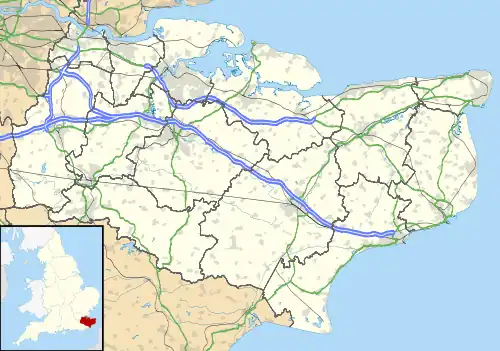 | |
 Bluebell Hill transmitting station (Kent) | |
| Tower height | 52.5 metres (172 ft) (A) 55 metres (180 ft) (B) 46 metres (151 ft) (C) 43 metres (141 ft) (South) |
|---|---|
| Coordinates | 51°19′26″N 0°31′14″E / 51.324°N 0.52054°E |
| Grid reference | TQ757613 |
| Built | 1974 |
| BBC region | BBC South East |
| ITV region | ITV Meridian |
| Local TV service | KMTV Kent |
The Bluebell Hill transmitting station is a broadcasting and telecommunications facility located at Blue Bell Hill between Maidstone and Rochester in the English county of Kent.
The station is situated on the crest of the North Downs and comprises five steel lattice towers, each 45 to 50 metres tall - their height being compromised by the location of nearby Rochester Airport. It broadcasts digital television, FM and DAB radio to much of north, west, and central Kent, and an overspill service into southern Essex. It stopped broadcasting analogue television when the digital switchover was completed on 27 June 2012. When in analogue service, the broadcast power of 30 kW for a main transmitter was unique in the United Kingdom, the strength being limited by potential interference with transmitters in France and the Low Countries.
Services broadcast include BBC One (South East), BBC Two, ITV1 (Meridian), Channel 4, Heart Kent, KMFM Medway and KMFM Maidstone. Between its opening in 1974 and 31 December 1981 the transmitter broadcast Thames Television (weekdays) and London Weekend Television (weekends), being switched on 1 January 1982 to carry signals from the new ITV franchise TVS (Television South), until superseded on 1 January 1993 by ITV Meridian for ITV in the south east. The transmitter takes its main BBC1 feed from Crystal Palace, with an opt-out for BBC local broadcasting in the South East relayed from studios in Tunbridge Wells. Although timing is of the essence at this point the human factor sometimes results in a delay of a second or two, enabling viewers to glimpse the London studio and presenter before the Tunbridge Wells studio appears. On occasion the local news is combined with the London or South region, usually through staff shortages at one studio or other. This amalgamated programme is usually broadcast from the Tunbridge Wells studio.
Bluebell Hill was originally an E group for analogue, then became a B group at DSO. At its 700 MHz clearance in July 2018 it became a K group (excluding the temporary MUXES 7 and 8). Most E groups and B groups, as well as widebands and K groups, will work satisfactorily on Bluebell Hill (see graph).
Services available
Analogue radio
| Frequency | kW | Service |
|---|---|---|
| 103.1 MHz | 2 | Heart South |
Digital radio
| Frequency | Block | kW | Operator |
|---|---|---|---|
| 218.640 MHz | 11B | 0.9 | DRG London |
| 220.352 MHz | 11C | 2 | NOW Kent |
| 222.064 MHz | 11D | 6.3 | Digital One |
| 223.936 MHz | 12A | 2 | Switch London |
| 225.648 MHz | 12B | 6.3 | BBC National DAB |
| 227.360 MHz | 12C | 1 | CE London |
Digital television
|
Before switchover
|
Analogue television
Analogue television transmissions have now ceased. BBC2 was closed on 13 June 2012 and the remaining three services on 27 June. Channel 5 was never broadcast from this transmitter.
| Frequency | UHF | kW | Service |
|---|---|---|---|
| 623.25 MHz | 40 | 30 | BBC1 South East |
| 647.25 MHz | 43 | 30 | Meridian |
| 671.25 MHz | 46 | 30 | BBC2 South East |
| 823.25 MHz | 65 | 30 | Channel 4 |